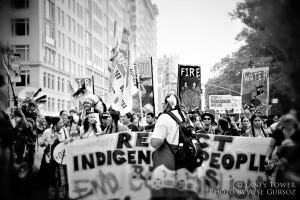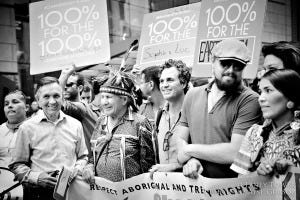 Indigenous delegates representing many nations, territories and organizations from across North and South America converged in New York City, leading the 400,000-strong People’s Climate March on Sept. 21.
Indigenous delegates representing many nations, territories and organizations from across North and South America converged in New York City, leading the 400,000-strong People’s Climate March on Sept. 21.The delegates united for a Just Transition, a set of principles calling for community-rooted economic models centered on clean energy and healthy communities.
“Indigenous peoples are rising up globally to protect the territorial integrity and rights of Mother Earth,” said Tom Goldtooth, executive director of the Indigenous Environmental Network and steering committee member of the Climate Justice Alliance.
“We came to New York City to call an end to CO2 colonialism and to tell world leaders to give Mother Earth a rest by making binding commitments to leave more than 80 percent of known fossil fuel reserves in the ground and the ocean floor.”
Celebrities Leonardo DiCaprio, Mark Ruffalo, Edward Norton and Sting all joined the indigenous bloc in solidarity.
“I’m with the indigenous group here . . . and they’ve always been at the forefront of this struggle, and I think it’s right that they’re at the front of it,” Sting said on Democracy Now. “Their message has always been the same: ‘The Planet’s in danger, and you better wise up.’”
The convergence of grassroots movements came in part as a response to the U.N. Climate Summit and the World Conference of Indigenous Peoples [WCIP], which ran Sept. 22–23.
 Both the U.N. summit and the WCIP are open to select world leaders from government, finance, business sectors and Indigenous groups.
Both the U.N. summit and the WCIP are open to select world leaders from government, finance, business sectors and Indigenous groups. Kandi Mossett, Native Energy & Climate Campaign organizer for the Indigenous Environment Network, was one of the 38 selected civil society members invited to attend the U.N. Climate Summit. She said the civil society members were segregated inside the U.N.
“We weren›t allowed into a private luncheon that the heads of state were at, and a lot of the civil society members were way out back in the nosebleed section in the balcony so we weren›t able to get close to any of the heads of state,” Mossett said.
President Barack Obama made an appearance at the U.N. climate summit and delivered a speech announcing that the U.S. will be committing to a 17 percent reduction in emissions below 2005 levels by 2020.
“That›s not enough,” Mossett said. “If we›re really serious about saving ourselves as a species on this planet, we need to commit to commit to at least 80 percent reduction in emissions by 2020 from 1990 levels.”

























